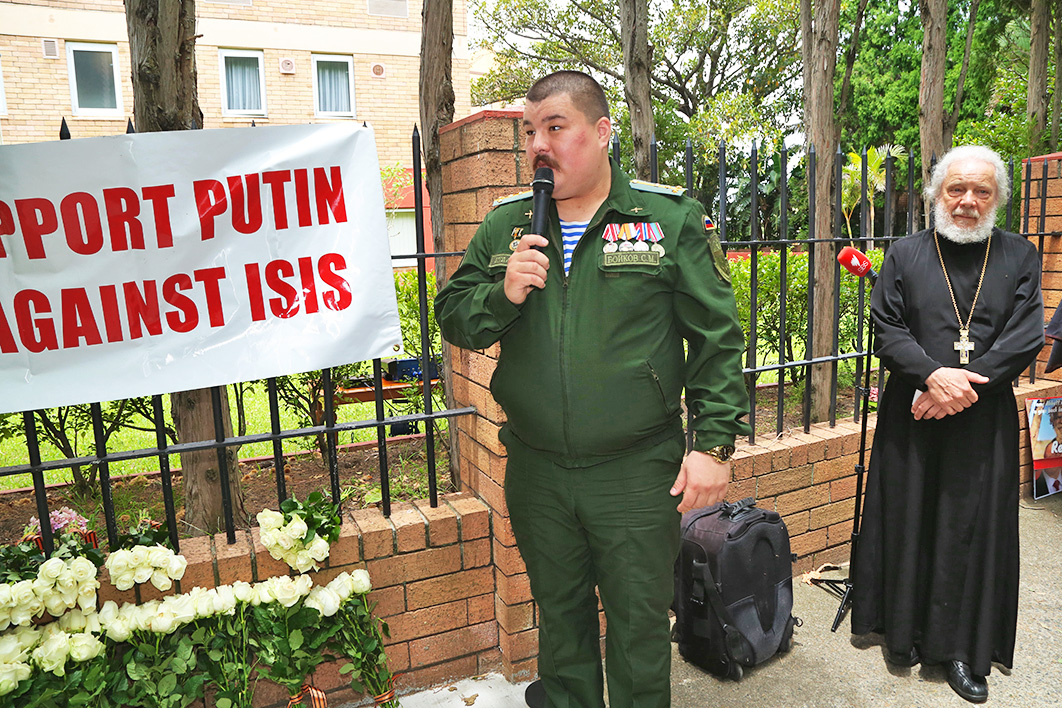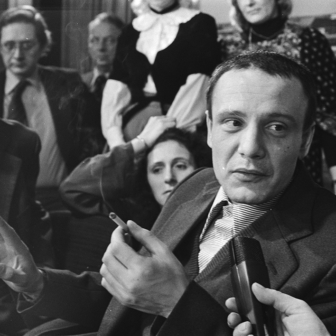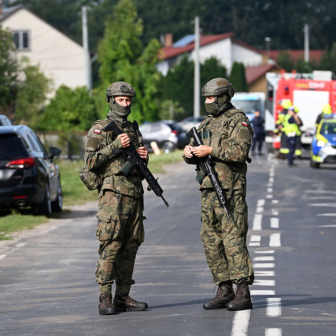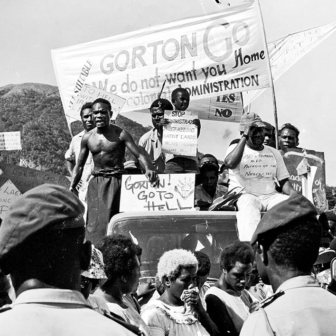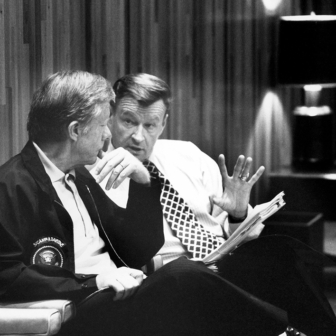Members of Australia’s Russian community taking part in annual commemorations of Nazi Germany’s surrender might have been startled in recent years by a group of burly men inspecting what they were wearing. Some of the men were clad in dark-green dress uniforms, with epaulets and medals, and others in the metal-studded leathers favoured by motorcycle gangs.
They also wore orange-and-black ribbons arranged in a neat bow pinned to their chests. This arrangement, known as a George’s Ribbon, was originally an insignia of the Russian imperial military, the orange symbolising fire and the black gunpowder. But since Russia’s annexation of Crimea in 2014 it has become a badge of devotion to Russia and fealty to its president. According to Moscow-based journalists Andrei Soldatov and Irina Borogan — courageous and expert commentators on sometimes-delicate security issues — it is “an ominous and aggressive political symbol” of an “anti-Western, pro-Kremlin agenda.”
The mysterious men at the 9 May celebrations claim to be the descendants of Siberian Cossacks who settled in Australia mainly from the 1920s until the 1950s. Because the anniversary has become the most important date on the official Russian calendar — a day on which, they believe, wearing the ribbon should be compulsory — they attend the celebrations to monitor whether community members are displaying the symbol and, what’s more, displaying it correctly. They are prefects of patriotism, monitoring Russian expatriates’ loyalty to Mother Russia under Vladimir Putin.
Behind the activities of these men is the long, complex history of the Cossacks. Even the origin of the name — kazak in Russian, qazaq in Turkic languages — is disputed, but most historians say it’s Turkic, that it meant “free wanderer or exile,” and that by the fifteenth century it denoted the ethnically motley inhabitants, often Tatar and Slav, of self-governing fortified settlements along the lower Dnieper and Don rivers.
By the sixteenth century the Cossacks had evolved from brigandage into an effective light cavalry for hire. Under agreements with successive tsars they were integrated into the Russian imperial army, with particular responsibility for protecting the empire’s southern borders. They were prominent in what Russian official histories call the “opening up” of Siberia.
Gradually the Cossacks took on another function, too, as a paramilitary police used to suppress dissent and internal unrest. By the nineteenth century they were both a border force and a national guard, with a reputation for brutal indiscipline in carrying out their gendarme function. As a New York Times writer puts it, “Before the Revolution, they had become infamous as the nail in the czarist boot, putting down peasant and worker uprisings and leading pogroms against the Jews and other minorities.”
Cossack historians might reject that charge, but there can be little doubt that the Cossacks took part in the pogroms against the Jewish population in the Pale of Settlement after the assassination of Tsar Alexander II in 1881 and those in the period 1903–06. In the early twentieth century, the Cossack motto, “For the Faith, the Tsar and the Fatherland,” was adopted by the anti-Semitic Union of the Russian People, which created armed squads (known as “black hundreds”) to carry out pogroms and assassinate those it identified as socialists or other brands of traitor.
Given their devotion to the Romanov dynasty, most Cossacks sided with the anti-Bolshevik forces in the Russian civil war of 1918–21; many then fled into exile, with some from Siberia finding refuge in China and eventually Australia. As a particular target of Stalin’s ruthless collectivisation campaign, those who remained were almost obliterated, and they continued to be suppressed throughout the Soviet period.
But in a remarkable revival, they re-emerged in post-Soviet Russia as a repository of militarist and ultranationalist values, with close ties to the Kremlin-dominated Russian Orthodox Church. Under Putin they have flourished, and he has eulogised them for their “well-known tradition of patriotism… so very important for the formation of Russian statehood in the minds of our people.”
The Russian government now funds Cossack cultural centres and martial arts and firearms clubs. And, under a law Putin signed in 2005, the Cossacks have been reincorporated into the state’s security and military structures.
Until Mikhail Gorbachev became general secretary of the Communist Party of the Soviet Union in 1985, all Soviet leaders saw the large Russian/Soviet diaspora in two contradictory ways: as a potential source of opposition and as an asset to be mobilised, together with non-Russian sympathisers, in undermining any state perceived to be an adversary. Primary responsibility for neutralising members of the former (in some cases by assassination) and identifying and exploiting the latter group lay with the KGB, under that or its earlier names.
In Australia, the best-known instances were Moscow’s marshalling, and in some cases recruitment, of members of the Communist Party of Australia and Russian émigrés, some working in sensitive positions in the Australian Public Service. The effects of that policy were felt in Australian politics until recently, and may still colour perceptions of Russia.
As the Soviet Union began to falter in the late 1980s and Soviet-backed communist parties in the West shrank, the policy of recruiting émigrés and fellow travellers fell into abeyance.
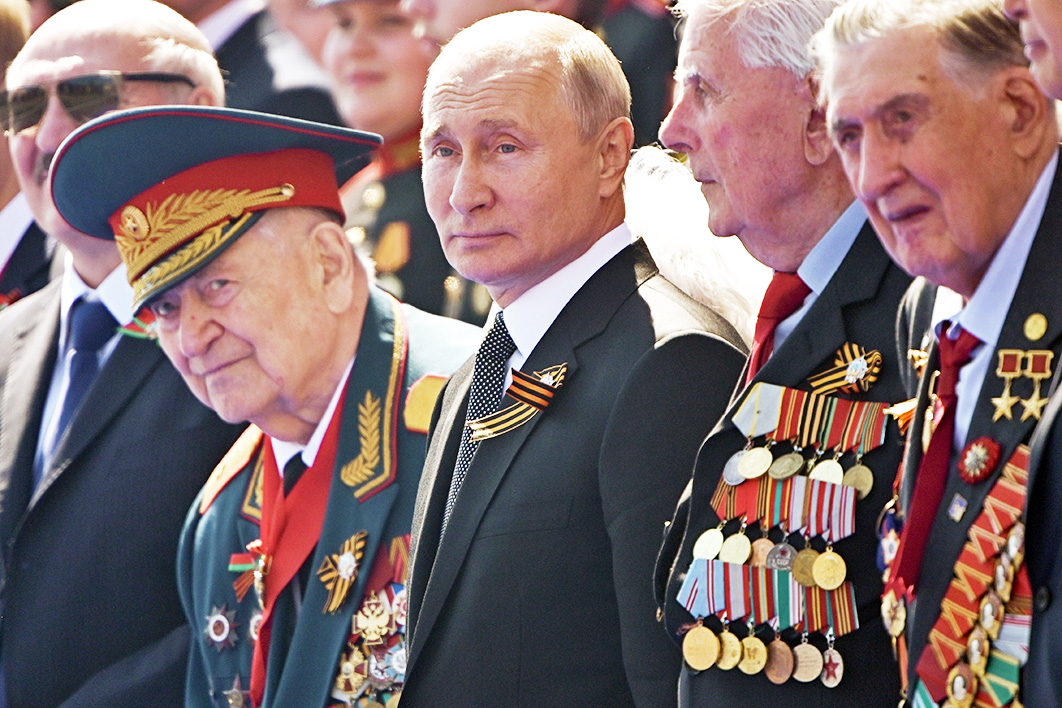
Wearing the George’s Ribbon, Russian president Vladimir Putin watches this year’s Victory Day parade in Moscow. Sergei Guneyev/Host Photo Agency via AP
During the nine chaotic years of Boris Yeltsin’s rule, after the rout of the KGB-initiated-and-led coup to overthrow Gorbachev in 1991, the Russian intelligence services manoeuvred to adapt and survive. The KGB was divided into the FSB (the domestic secret police) and the SVR (the Russian foreign intelligence service) but was not reformed. Now, after two decades with one of their own as Russia’s ruler, they are probably better resourced and, in the FSB’s case at least, more independently powerful than ever before.
Under Putin, efforts to tap the Russian diaspora as an asset have been refined and strengthened. In October 2001, while still consolidating his power, Putin set out a concept of the diaspora as an attribute of a strong Russian state, proclaiming the notion of russkij mir, or the Russian World. (Mir is a capacious word meaning “world,” “community” or “peace,” depending on the context.) No matter where they may live, said Putin, all Russians and all those claiming Russian heritage would henceforth be seen not as “émigrés” but as “compatriots,” a global tribe dispersed but united by a commitment to the Fatherland.
Russkij Mir is also the title of one of a phalanx of new state agencies and “foundations” Putin has charged with creating this cohesion and maximising Russia’s global influence. Russia is not alone in this, of course: China, for instance, has a virtually identical policy of moulding and mobilising patriotic feeling in its diaspora, the implementation of which is coordinated by the Communist Party’s United Front Work Department. The Russkij Mir Foundation also recalls the Overseas Compatriots Central Committee established by the Japanese in 1940.
The foundation was formally established in 2007. In 2009 its regional director for the Asia-Pacific approached a number of leading Australian universities, including Queensland, Sydney and the ANU, offering to fund “centres of Russian language and culture.” The offers were declined, partly because the Russians insisted on the right to appoint the centres’ directors.
More recently, the policy of marshalling the diaspora has also been underpinned by the Law on State Policy towards Compatriots Abroad, key provisions of which were reflected in recent amendments to the Russian constitution. The law defines anyone anywhere “who speaks Russian and identifies with/observes the [values of the] associated culture” as a “compatriot,” whose rights, as they are defined by the Russian state, the Russian state undertakes to protect.
As it happens, the Russkij Mir Foundation — which, like China’s Confucius Institutes, claims to focus solely on propagating culture and language — is headed by a prominent member of the State Duma, the parliament endowed with Putinist characteristics. That Duma deputy, Vyacheslav Nikonov, happens to be the grandson of Stalin’s foreign minister, Vyacheslav Molotov, of the notorious Molotov–Ribbentrop Pact. Molotov played a key role in the fate of Labor Party leader H.V. “Bert” Evatt, the most prominent casualty of the Petrov affair, the case that shone a spotlight on Russian recruitment of émigrés and supporters in Australia.
Which brings us back to Australia, and the ribbon-monitoring Cossacks. In a New Year’s Eve address at the end of 2018, the then Russian ambassador, Grigory Logvinov, made a passionate appeal to the Russian diaspora in Australia:
Never before in its recent history… has Russia been subjected to such a coordinated, aggressive campaign of vilification, abuse and slander… on various anti-Russian themes, be it the MH17 disaster, the so-called Skripal affair or the use of chemicals [weapons] in Syria… We in the embassy would be most grateful for any support, moral and political, that our compatriots can give, within, of course, the bounds permitted under Australian legislation.
One group among Logvinov’s audience needed no urging: a self-proclaimed stanitsa (garrison) of “Siberian Cossacks” in Australia calling themselves “the Embassy to Australia of the Zabaikal’sk Cossack Host” (zabaikal’sk signifies a region in Siberia to the east of Lake Baikal, as seen from European Russia).
These Australians claim to be the descendants of Cossacks and the repository of their traditions. They first made their presence felt in 2014, the year of Russia’s annexation of Crimea and the uprising by Russian proxy forces in eastern Ukraine, among whom Russia-based Cossacks were conspicuous. Citing no source for the figure, a Russian website asserts that 10,000 Australians have Cossack forebears.
Bedecked in locally tailored Cossack dress uniforms, Australia’s newly minted Cossacks began to mount demonstrations in Sydney and Melbourne in support of the so-called “Democratic Republics of Donetsk and Lugansk” — that is, the territory of Ukraine still held by Russian-led and -equipped proxy forces.
A leader, Simeon Boikov (also known as Semyon Boikov), had emerged, and was titled Ataman. (The word means “chieftain,” and is a cognate of “ottoman,” reflecting the strong Turkic gene in the Cossacks’ evolution.) A Russian website supplies the following information about him:
Ataman Boikov was born in 1990. The fifth generation of an original migrant family, he relates that his father is a Russian Orthodox priest, whose family succeeded in preserving the Russian language and raised its children to love Russia. “We never felt ourselves to be Australian, we were aliens there. I consider myself to be a Russian.” A period of study in the Sretensky Monastery in Moscow, which he undertook in 2008, was decisive in his identification [with Russia]. “One may say that while I was studying there I was, well, we must not say recruited, right? Basically, I fell under the influence of rightly thinking pro-Russian elements. They began to fashion a pro-Russian adult from a young Australian [citizen].”
He credits his transformation in particular to Father Tikhon Shevkunov: “this is a most influential person — in the church, in the state and in society. He has always supported strongly any activity connected with reuniting [Orthodox] churches outside Russia with the Moscow Patriarchate, and in general with reuniting Russian emigrants, the diaspora, with Russia.”
The Sretensky Monastery, which is close by the headquarters of the KGB in central Moscow, is reported to have close ties to the KGB’s successors, the FSB and the SVR. Father Shevkunov, now an archimandrite, is sometimes called “Putin’s spiritual adviser.”
Here is Boikov as reported by the Russian digital journal Vzglyad under the headline “Cossacks in Australia Speak of Supporting Russia in a ‘Hostile’ Country”:
“I consider myself a proponent of a strong Russian state. We’ll always support the policies of the [Russian] state, we respect very much our Commander-in-Chief, Putin. And we have a unique capacity to support Russia from within a hostile state. Even the FSB or a battalion of the Russian SAS can’t achieve that, because unlike them we are citizens of this state.” The group that Boikov leads claims to have about 150 members. Although the group is registered as “historical-cultural association,” its members appear to be militarised: they wear uniforms with epaulets and badges of rank, and carry out Cossack military drills. But according to Boikov, they see their main task as carrying out so-called people’s diplomacy… “We organise demonstrations in support of the return of Crimea [to Russia], in support of our army in Syria, in support of the Donetsk and Lugansk People’s Republics.” The Ataman adds that while they cannot go into battle with sabres, Russian long rifles and Maxim machine guns, as their grandfathers did, they can prosecute another form of war — an information war.
Boikov seems to have been a key figure in securing funding from Russia for the publication of the “garrison’s” own monthly newspaper, Russkij Rubezh (Russian Frontier), twenty-six issues of which appeared from early 2015 to mid 2017, initially with a print run of 2000 later increased to 5000. The masthead carried the traditional Cossack motto and war cry: “For the (Russian Orthodox) Faith, the Tsar and the Fatherland.” The paper’s title suggests that its owners and editors see Russia’s frontier as running through Australia, which recalls the bon mot from Russian history that only a border with Russian soldiers on both sides of it is genuinely secure. The notion is also consistent with the Cossacks’ traditional role of protecting Russia’s borders.
Russkij Rubezh’s editorials, and its reports reprinted from ultranationalist Russian sources, reflected the group’s identification with the militarist-imperialist and authoritarian ethos of tsarist — and now Putin’s — Russia. Its members declared their support for the Russian campaign in eastern Ukraine, adopted the flag of the separatist entities as one of their own banners, and implied that some of their number fought there with the proxy forces. The paper branded as traitors any Australians of Russian origin who did not share its views. It routinely retailed luridly xenophobic and homophobic views and — in the edition of December 2015, for instance — anti-Semitic sentiments.
Russkij Rubezh ceased publication without explanation in June 2017, suggesting that the source of its funding had dried up. Three years on, in mid May this year, it reappeared, with a print run of 5000, a supplement in English and much wider circulation to all state capitals. Clearly, a new source of funding had been found, perhaps by Boikov during a visit to Moscow late last year.
“[We] remind all our compatriots in Australia who are enemies of Russia that our newspaper is back on the battle line,” said the May editorial. “Take responsibility for your words and actions lest you find yourselves exposed as the subjects of our publications.”
As before, the paper identifies its chief sponsor as the Institute of North Asia and Eurasian Integrational Processes, about which the internet reveals little other than an address in Chita, a city in the Zabaikal’sk region of Siberia. But the paper appears to owe its reanimation to Konstantin Malofeev, a figure conspicuous in Russia as “the Orthodox oligarch” — or to those he works for, or with.
Together with his ties to the nomenklatura of the Russian Orthodox Church, Malofeev is well known for his ultranationalism, championing of “traditional values” and propagation of conspiracy theories. Among the latter are his assertions that Bill Gates and “Western intelligence agencies” are the source of Covid-19, and that Gates plans to “enchip” the entire Russian population. The sources of Malofeev’s apparent wealth are mysterious.
Malofeev is best known for the role he played in the insurgency in eastern Ukraine. In April 2014, Igor Girkin, the former head of security for one of his “private equity” firms, Marshall Capital Partners Ltd, crossed from Russia into Ukraine with about fifty fighters to lead the first armed assault on a Ukrainian-government entity. Girkin eventually took command of the “People’s Army of the Republic of Donetsk” and then became its “minister of defence.”
Girkin served with the FSB from 1998 to 2005 and has since been identified by the European Union as an officer of the Main Intelligence Directorate of the General Staff of the Armed Forces of the Russian Federation, or GRU. He’s better known by his nom de guerre, Strelkov — meaning “the rifleman” or “the shooter.” (Readers of Pasternak’s Doctor Zhivago may recall the ruthless Bolshevik commander “Strelnikov.”)
“By mid-2014,” reports the investigative website Bellingcat, “a clear pattern had emerged: the Kremlin used Malofeev as the initiator and proxy funder of active measures — including military operations — in Ukraine, providing deniability to Russia in case the operation failed.” In this way, Malofeev and his employees share responsibility for the deaths of thirty-eight Australians and 260 other passengers and crew on Flight MH17 in July 2014. Since 2014, he has been sanctioned by the European Union “for the destabilisation of Eastern Ukraine.”
Malofeev also claims to be the founder of the Society of the Double-headed Eagle for the Propagation of Russian Historical Enlightenment, which takes its name from the imperial eagle of the tsarist coat of arms, restored by Putin as Russia’s. The society heads a revised list of partners published by Russkij Rubezh; as its name suggests, its declared goal is to “enlighten all compatriots” by inculcating the correct view of history in the minds of all inhabitants of the Russian World.
This impulse to control not just what people do but also what they think has a robust tradition in Russia, stretching back at least to Peter the Great and reaching an apogee under Lenin and Stalin. Putin himself is a product of the training, practice and ethos of the KGB, the successor to the Cheka, the Soviet agency Lenin set up to impose and maintain this pervasive control.
Putin’s former culture minister, Vladimir Medinsky, has written that “if a state’s elite does not strive to mould the consciousness of its citizens… their minds will either be a vacuum or polluted by foreign garbage.” Much preoccupied with controlling the past so as to mould the present, Putin recently arranged for the goal defined by Medinsky to be enshrined in the Russian constitution.
That was among more than 200 amendments voted on in Russia’s recent constitutional plebiscite, which ran from 25 June to 1 July. According to official figures, the amendments were endorsed by 78 per cent of the 69 per cent of eligible voters who participated. In an apparent misstep in orchestrating the result, though, or perhaps a display of arrogance, copies of the revised constitution were on sale in Moscow bookstores well in advance of the voting period. A group of well-known Russian political scientists who analysed the figures concluded that 37 per cent of the votes were falsified and that the real turnout figure was about 43 per cent, of which 65 per cent voted for the amendments.
Reportedly at the urging of the Russian Orthodox Church, the amendments also include an article pledging homage to the “ancestors who bequeathed to us their ideals and belief in God.” Yet Article 14, the foundational Chapter 1 of the 1993 constitution, defines Russia as a secular state and says that “no religion may be established as official or obligatory.” Another amendment describes marriage as a “union of a man and a woman,” thereby confirming traditional values and effectively outlawing same-sex marriage. And another pledges to protect historical truth and forbid “belittling the people’s heroic protection of the Fatherland” — that is, querying Putin’s increasingly mendacious version of the history of the second world war.
The State Duma also received a redraft of the existing federal law “On Education,” in which greater emphasis is placed on “the imperative of instilling patriotic sentiment in schoolchildren.” All of the goals defined by these amendments are pervasive themes in the re-emerged Russkij Rubezh.
According to Russian journalists who have investigated Konstantin Malofeev’s activities and links, he is close to Putin confidante Archimandrite Shevkunov, the “Father Tikhon” identified by “Ataman” Boikov as his primary mentor. Ostensibly serving under Malofeev in the Double-headed Eagle society is its executive director, Leonid Reshetnikov, a lieutenant-general in the SVR. Reshetnikov’s official biography, reprinted by Russkij Rubezh, has him “working in espionage abroad from 1976 to 2009.” From 2009 till 2017 he was director of the Centre for Analytical Research, a secretive unit in the Russian presidential administration credited by Reuters and the BBC with a significant role in the successful Russian campaign to influence the US presidential elections in 2016.
Officially, General Reshetnikov has retired from active service, but, as Putin famously said, there is no such thing as a former KGB officer. (On retirement, FSB and SVR officers are considered to be members of a “reserve” from which they can be recalled to active service at any time.) In Moscow, the Double-headed Eagle society is registered at an address shared with the Centre for Analytical Research. It seems most unlikely that a lieutenant-general of the SVR would take his orders from private citizen Malofeev.
To conduct the society’s campaign to ensure that all Russians in Australia, and their children, hold the correct views and beliefs, Reshetnikov has appointed Valery Malinovsky, a “young [Russian] entrepreneur going places,” as its Australian chief representative, with Boikov as his deputy. A letter of their appointment, published in Russkij Rubezh, charges them with “preserving the cultural identity and a correct historical memory of our compatriots.”
In an interview to introduce Malinovsky to its readers, Russkij Rubezh asked him what he sought to achieve. He replied that the society he heads “unites people of integrity, Russian patriots, who wish to change the situation in their homeland and perceptions of Russia beyond its borders for the better.” Asked how Russians differed from Australians, Malinovsky replied that Russians “have deeper emotions; are more hard-working; stand for traditional values — we believe that a woman’s role is to preserve hearth and home, whereas Australian women are feminists who do not put the family first; and we are more patriotic.”
Elsewhere in the same edition, the work of the Double-headed Eagle society is presented thus:
Russian history is one of the most slandered and traduced phenomena in human history. The task of recreating a genuine, multi-hued-and-faceted, objective reality of Russia in history is akin to a restoration: slowly, layer by layer, the accretions of recent periods must be peeled away to reveal the original image of Russia in all its pristine beauty.
To sum up, then, we have a group of Australians of Russian heritage, the Australian Cossack Garrisons, who are funded by a “Russian Orthodox oligarch” (or perhaps by anonymous state functionaries who channel money to him). They have a patron who was complicit in the destruction of MH17, who claims that Bill Gates and “Western intelligence services” created Covid-19, and who is supervised by a former senior officer of the SVR and therefore effectively incorporated into Russia’s security and military structures. And they themselves are dedicated to policing devotion to the Fatherland among Russians in the “hostile country” in which they apparently prefer to live. •
